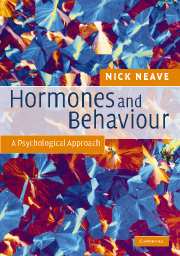Book contents
- Frontmatter
- Contents
- List of diagrams
- Preface
- Acknowledgements
- 1 Background to psychobiology
- 2 Hormones and the endocrine system
- 3 Behavioural endocrinology
- 4 Neurological effects of hormones
- 5 Typical sexual determination/differentiation
- 6 Atypical sexual differentiation
- 7 Neural differentiation
- 8 Reproductive/sexual behaviours
- 9 Attachment/parental behaviours
- 10 Aggressive/competitive behaviours
- 11 Sex steroids and cognition
- References
- Index
2 - Hormones and the endocrine system
Published online by Cambridge University Press: 05 June 2012
- Frontmatter
- Contents
- List of diagrams
- Preface
- Acknowledgements
- 1 Background to psychobiology
- 2 Hormones and the endocrine system
- 3 Behavioural endocrinology
- 4 Neurological effects of hormones
- 5 Typical sexual determination/differentiation
- 6 Atypical sexual differentiation
- 7 Neural differentiation
- 8 Reproductive/sexual behaviours
- 9 Attachment/parental behaviours
- 10 Aggressive/competitive behaviours
- 11 Sex steroids and cognition
- References
- Index
Summary
Historical background
The term ‘hormone’ derives from the Greek verb ‘ormoa’ (meaning ‘I excite’, or ‘I arouse’) and was first introduced by the physiologist Ernest Henry Starling in his now-famous 1905 Croonian lecture entitled ‘The chemical correlation of the functions of the body’. The scientific definition of this term was long overdue as the realisation that certain substances must be travelling around the body and influencing both physiology and behaviour was not limited to a small number of scientific minds. Any humble farmer could describe in detail the powerful effects of castration upon a young male animal; rather more discomfiting was the common knowledge that castration also had the same kinds of physical and behavioural effects on young human males, as numerous eunuchs and castrati singers were able to testify (see chapter 3).
A series of eminent scientists had indeed been on the verge of formally discovering and describing hormone action (though it would be several years before an actual hormone was discovered). In 1855, Claude Bernard coined the term ‘internal secretion’, a phrase he had used to describe the release of glucose from glycogen. Until Starling's talk however, this term had been used in a rather ad hoc manner to describe the passage of any molecule from tissues into blood, and thus the specific meaning that he originally envisaged had been somewhat lost (Henderson, 2005).
- Type
- Chapter
- Information
- Hormones and BehaviourA Psychological Approach, pp. 22 - 47Publisher: Cambridge University PressPrint publication year: 2007
- 1
- Cited by

